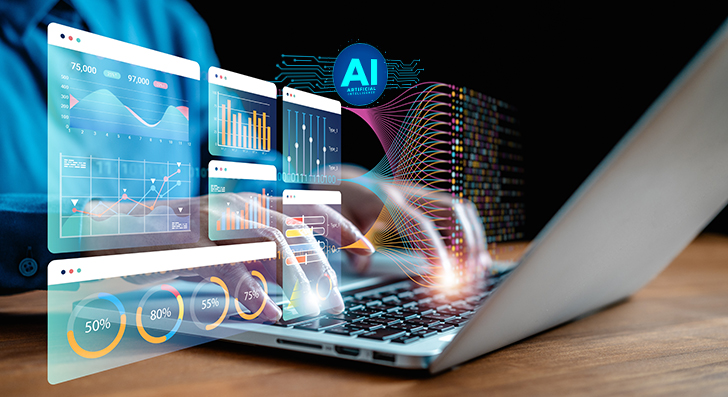In an age where technology drives performance, AI-powered data processing plays a key role in driving efficiency and accelerating the decision-making process. This is because traditional data processing methods have limited capabilities when it comes to handling the sheer volume, variety, and velocity of data generated at present. Moreover, pooling and processing overwhelming amounts of data manually is time-consuming and prone to human error. Such an approach is unreliable, hinders efficiency, and ties up resources that could be strategically utilized elsewhere. Most importantly, it negatively impacts an organization’s decision-making capabilities.
According to recent stats, the global AI market is valued at $196 billion, expanding at a CAGR of 38.1% between 2022 to 2030. There’s no doubt that AI holds immense potential and is creatively disrupting business processes. For businesses looking to make informed decisions to stand out and innovate, implementing AI-powered data processing solutions is the ideal option. After all, AI isn’t just about automating tasks, but a strategic investment in efficiency, agility, scalability, and competitiveness. Consider the following example to better understand the difference between a regular computing program and AI-driven data processing:
The marks of 15 students in a class are -1, 3, 5, 6, 8, 9, 12, 7, 13, 40, 60, 65, 70, 95, 100. Based on this, the AI-based processing model has to rate the overall class on a scale from A-E (according to the slabs like 0-20 is E, 21-40 is D, and so on).The difference between an AI and a regular computer program is the same as the two men in this saying-“Give a man a fish and he’ll eat for a day. Teach a man how to fish, and he’ll eat for his lifetime.” The first man here is like a regular computer program that does not learn on its own and provides an output only when input data is given. On the contrary, AI is the man you teach “how” once—who not only learns and improves on its own but also gives the desired output with rules and methods of what to do with certain kinds of data.
For instance, a regular computer program might take an average of 10 marks and rate accordingly. Whereas an AI tool identifies the outlier (100 in the current scenario) and then gives us the answer. This clearly shows the difference between both worlds and illustrates how AI-powered data processing is the way forward.
Impact of AI in Transforming Business Data Processing
Perks of Investing in AI-Driven Business Data Processing
An AI-based system marks of 15 students in a class (1, 3, 5, 6, 8, 9, 12, 7, 13, 40, 60, 65, 70, 95, 100). Based on this, the data-driven model has to rate the overall class on a scale from A-E (according to the slabs like 0-20 is E, 21-40 is D and so on).
The difference between an AI and a regular computer program is the same as the two men in this saying, which goes like “Give a man a fish and he’ll eat for a day. Teach a man to fish, and he’ll eat for his lifetime.” The first man here is like a regular computer program that does not learn on its own and provides an output only when input data is given. On the contrary, AI is the man you teach “how” once—who not only learns and improves on its own but also gives the desired output with rules and methods of what to do with certain kinds of data.
For instance, a regular computer program might take an average of 10 marks and rate it based on that. Whereas, an AI will be able to identify the outlier (100 in the current scenario) and then give us the answer—that clearly shows the difference between both the worlds and illustrates how AI gets ahead of all with the help of Machine Learning.
Perks of Investing in AI-Driven Business Data Processing
Adopting AI-based data processing solutions helps businesses achieve maximum out of the minimum. It is the proven way for organizations to save time and effort that are spent in handling and managing non-core but important business processes. Examples of these include bank reconciliation, payroll processing, expense tracking, credit card management, and so on. When it comes to handling all these processes at once, AI is the key to improving efficiency and increasing productivity.
Some of the irresistible benefits of engaging in AI-fueled data processing services are as follows:
1. Accelerated Process
Big data in the form of photos, videos, audio, text, geospatial data, and wireless communication data generated by the Internet, sensor networks, and other such equipment has become an essential asset for many organizations. Furthermore, the Internet of Things (IoT) includes real-time data analysis, NLP, computer vision, social computing, speech recognition, etc. Businesses need to pool and process this data to gather insights and intelligence to make informed decisions and strategies that drive growth. Hence, many organizations are leveraging AI-driven data processing solutions to deal with massive volumes of heterogeneous data and speed up the entire cycle.
2. Improved Decision Making
Data is the driving force behind every successful business, regardless of its industry. And companies are collecting as much data as they can, be it from customers, employees, vendors, or business partners, and leverage it for multiple purposes, including gaining a competitive edge.
However, numerous companies face a major challenge when trying to utilize the massive amount of unstructured data. Transforming massive amounts of raw data into actionable intelligence within the stipulated time is a significant undertaking. Thanks to AI-powered data processing solutions, gaining valuable insights in real-time has become easier. Simply put, advanced data processing solutions improve decision-making capabilities at the workplace by providing real-time insights into critical situations and identify potential risks before they happen.
3. Optimized Expenditures
AI-based data processing has a lot of potential to streamline workflows and generate greater profits for businesses, irrespective of its industry or verticals. The advanced solutions shorten the data processing cycle times, which reduces the operational costs and helps in better utilization of the employees’ time. These resources can be used strategically, and employees can better focus on core competencies and innovative tasks that drive business growth.
4. Agility and Efficiency
Efficiency and agility are important for businesses to adapt to dynamic market changes and capitalize upon the passing opportunities. Automated data processing solutions come as saviors here, offering businesses the due agility and efficiency to maintain a competitive edge. The automated solutions reduce human errors and enable real-time processing of large datasets. This instant access to insights helps in making informed decisions faster and improves overall operational productivity.
Final Words
The rapid adoption of innovative technologies has led to more intelligent and efficient business. That said, AI in data management is taking the lead, transforming traditional data processing workflows, making them smart, time-saving, and efficient. Not only this, but quality assurance, shortened processing times, and real-time analysis are also the areas where AI delivers tangible results.






